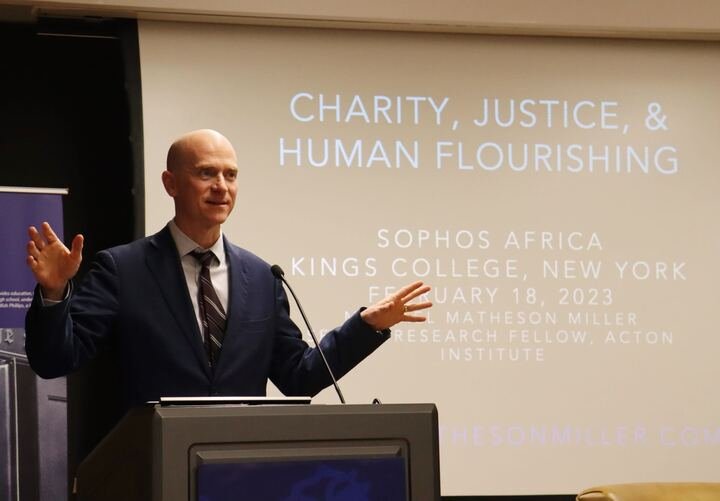Ethiopian Minister of Justice Speaks at King’s for SOPHOS AFRICA Foreign Aid Conference
New York University economics professor Dr. William Easterly (left) and Dr. Gedion Timothewos, the Minister of Justice for Ethiopia (right) | Photo by Leocciano Callao
The King’s College hosted the“Africa in Context: Aid, Entrepreneurship and US-Ethiopia Relations” conference on Feb. 18 to launch the non-profit organization SOPHOS AFRICA.
The conference featured notable keynote speakers such as Ethiopia’s Minister of Justice, best-selling author and New York University economics professor Dr. William Easterly and Poverty, Inc. director Michael Miller.
SOPHOS AFRICA is a non-profit organization that works with various partners to address systemic poverty in Africa through enabled individuals. According to its mission and vision statement, the organization “envisions that a critical mass of socio-culturally and economically transformed women and men can transform people and places in Africa.”
SOPHOS AFRICA founder Desta Heliso (right) at the podium | Photo by Leocciano Callao
The Honorable Dr. Gedion Timothewos, the Minister of Justice for Ethiopia, gave the keynote speech for the conference. He spoke on “the impact of aid on Ethiopian politics and geopolitical dynamics.”
Timothewos outlined the benefits and harms of foreign aid and argued that aid overall does more harm than good.
The benefits of foreign aid to Ethiopia include an influx of resources for institutions that support health and well-being, such as hospitals and health centers.
However, “aid has undermined the link between governments and those they govern,” according to Timothewos. “In a society where wealth is created through productive activities and value addition in the economy, the road to riches is through private enterprise… But in poor countries where resources are concentrated in the hands of the government, political power becomes a much sought after commodity as an instrument of resource accumulation.”
He concluded by stating that “we need a more nuanced and contextualized way of thinking about foreign aid… a roadmap rooted in the realities of each specific country that charts out the path for its prosperity and an end to dependence within a realistic timeframe.”
Easterly spoke on the history of foreign aid to African countries and its lack of success over the past century.
“Where aid is needed, it does not work,” Easterly said. “Where aid works, it is not needed. That’s the Paradox of Aid. There's a tragic inverse correlation between need and effectiveness.”
Easterly argued that one possible solution to break the cycle of poverty in African countries is specialization in economic goods so they can participate more fully in global trade markets. He cited successful examples such as cut flowers exported from Kenya to the Netherlands and the rise of Burundi coffee in Brooklyn cafes.
Easterly concluded by saying, “The important thing in this debate is not whether you're optimistic or pessimistic. It is who you're optimistic about.”
Poverty, Inc. director Michael Miller | Photo by Leocciano Callao
Miller spoke about the problems with the mentality behind humanitarian aid and non-government organizations. “It's not simply foreign aid that's a problem,” Miller said. “It's actually a deeper whole vision of how we think about the developing world.”
Miller argued that the Western world often treats people in developing countries as “problems to solve.”
“We have treated poor people like objects,” he said, “instead of thinking of them as a subject… and the protagonist of their own story of development.”
Miller then discussed the equating of charity and humanitarianism. “The idea of charity, properly understood, is love,” Miller explained. Humanitarianism, on the other hand, “is a secular, hollowed-out version of Christian love. It reduces care to providing physical comfort… sometimes giving you what you need delays the development of business and creates dependency.”
“Poor people in the developing world are not poor primarily because they lack stuff,” Miller concluded. “They're poor primarily because they are excluded from the institutions of justice that would enable them to create prosperity in their own families and in their own communities.”
“I felt that the conference achieved its dual purpose,” said SOPHOS AFRICA founder Dr. Desta Heliso in an interview after the event. “I believe that a strong foundation was laid to promote the vision of SOPHOS AFRICA in the USA more effectively and engage with relevant bodies in relation to the issue of foreign aid to Africa, which has failed to achieve its desired goal of ending poverty in Africa.”
Zoe Dummond, a sophomore of the House of Corrie Ten Boom, contributed to this report.
Melinda Huspen is the Managing Editor of the Empire State Tribune. She is a junior at The King’s College studying Journalism, Culture and Society.



